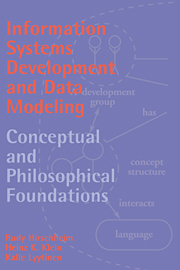Book contents
- Frontmatter
- Contents
- Preface
- Acknowledgements
- 1 Introduction
- 2 Definition and Evolution of Information Systems Development Methodologies and Data Modeling
- 3 Philosophical Foundations
- 4 Conceptual and Paradigmatic Foundations of ISD
- 5 Paradigmatic Analysis of ISD Methodologies
- 6 Conceptual and Paradigmatic Foundations of Data Modeling
- 7 Paradigmatic Analysis of Data Modeling Approaches
- 8 Conclusions
- Appendix A Summaries of Selected Methodologies
- Bibliography
- Index
3 - Philosophical Foundations
Published online by Cambridge University Press: 05 November 2011
- Frontmatter
- Contents
- Preface
- Acknowledgements
- 1 Introduction
- 2 Definition and Evolution of Information Systems Development Methodologies and Data Modeling
- 3 Philosophical Foundations
- 4 Conceptual and Paradigmatic Foundations of ISD
- 5 Paradigmatic Analysis of ISD Methodologies
- 6 Conceptual and Paradigmatic Foundations of Data Modeling
- 7 Paradigmatic Analysis of Data Modeling Approaches
- 8 Conclusions
- Appendix A Summaries of Selected Methodologies
- Bibliography
- Index
Summary
Introduction
All systems developers approach the development task with a number of explicit and implicit assumptions about, for example, the nature of human organizations, the nature of the design task, the value of technology, and what is expected of them. As was noted in chapter 2, these assumptions play a central role in guiding the information systems development process. They guide not only the definition of object systems, but also the preferred approach to inquiry, i.e. how the developers improve their understanding and knowledge about them. The assumptions can either be held by the system developers or be embedded in their preferred development approach. In either case they affect the designed and implemented system.
But in order to understand the relationship between assumptions and development approaches we need to elaborate on the notion of ‘paradigm’ and how it applies to ISD. An exploration of the philosophical assumptions underlying different methodologies and their tools is a prerequisite for a better understanding of the influence of philosophical attitudes on the practice of ISD. Groups of related assumptions about reality and knowledge are at the core of research paradigms. By introducing a general classification of the assumptions that characterize alternative research paradigms, this chapter provides the philosophical basis for the analysis of ISD and data modeling in the subsequent chapters of this book.
The purpose of this chapter is to look at the nature and kinds of philosophical assumptions that are made in the literature on information systems development and data modeling.
- Type
- Chapter
- Information
- Information Systems Development and Data ModelingConceptual and Philosophical Foundations, pp. 46 - 67Publisher: Cambridge University PressPrint publication year: 1995



